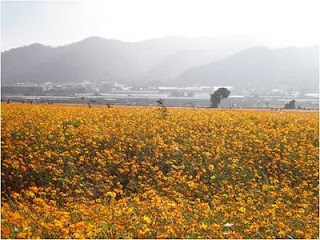現在密教盛行,夏瑪巴曾說:「修學密法宜先學顯教十二年以上。」
密法中有許多方便,幫助弟子在世俗事業轉變,極為快速靈驗。但若弟子不瞭解佛教的因果與業力,就極容易走上歧途。因為,如果某弟子為了求財請上師修法,果真財源滾滾來,弟子自然生起信心。但如果生意失敗或賠錢時,是否便對佛法失去了信心?所以顯教講「因果不繆」「所受是苦」是共通于密教的。但現今許多信徒不明白這個理,不承認是自己的福報不夠,只認為是師父的功力不夠,不能「扭轉乾坤」。
數年前與朋友在一間東密的寺院裡看見了一尊愛染明王,急欲結婚又無對象的友人問曰:「『愛染明王』是管人世間的愛情?」另一友人取笑答曰:「那麼『孔雀明王』就是管飛機的了?」。「其因不正,果遭迂曲」的道理在這個急切步驟的時代裡極易被漠視,我們應小心提防!提防之術仍是顯教講的:滿足、認命、承認因果不繆。諸行無常、諸法無我、實踐六度等等……,這些法足夠讓我們過著踏實的人生。
密法在行門上,成佛的確可以更快速,但密法中的息、增、懷、誅只是方便。如果沒有過去的耕耘,現在只是想有美好的果實,這種佛法就太沒天理了。
Vajrayana Buddhism is quite popular now a days; Shamar Rinpoche once said, “before one starts to learn Vajrayana Buddhism, one should have a foundation in studying under Chinese Mahayana Buddhism for more than twelve years." There are many skillful methods to help the disciples’ worldly affairs; the improvement comes rapidly and effectively. However, if the disciples do not understand the law of cause and effect or the law of karma, then they go astray easily. Because, if disciples came to their guru to request for a blessing in order to increase their wealth and then money really increases as a result, then the disciples’ confidence naturally rises. However, if their business fail or lose money, will they lose confidence in Buddha Dharma? So, the teachings such as "the law of cause and effect never errors", "all that one bears and receives will inevitably turn into suffering" are interchangable in both Vajrayana and Mahayana Buddhism. But today many disciples still do not understand this logic and do not recognize they have not accumulated enough merit to receive the blessings, but they only blame their guru for not having enough power to "turn things around."
A few years ago, I went with some friends to a Japanese Vajrayana temple and saw a Ragaraja statue. A friend who was anxious to get marry but had no prospect so far asked, “is Ragaraja in charge of match-making?" The other friend made fun of him and gave this answer, “so you mean that Mahamayuri must be in charge of controlling airplanes?" “If the motivation is not accurate, then the result must be torturous"; we see that this wise saying is easily ignored in this era of instant gratification. We should beware! Guarding one’s mind was also taught is Chinese Mahayana Buddhism such as to be content, to accept one’s fate, to recognize the law of cause and effect doesn’t err, all phenomena are impermanent, all phenomena are without ego-grasping, to practice the Six Paramitas and so on …, these teachings are enough to inspire us to live a stable and fulfilled life.
Tantric Buddhism consists indeed more skillful means to assist one to reach Buddhahood, but these methods, such as to pacify, to benefit, to care with loving-kindness and to remove one’s own defilement, are after all skillful means. Without working hard in the past, one just wishes to have good results, then there’s no justice.











